Zinc is a vital mineral that plays a crucial role in maintaining our overall health. It is involved in various functions of the body, including metabolism, immune system maintenance, and tissue repair. While we often associate zinc with animal-based foods, there are several fruits that are also abundant in this essential nutrient. Fruits containing zinc include avocados, blackberries, pomegranates.
Incorporating these zinc-rich fruits into your daily diet can help boost your health and ensure that you meet your daily zinc requirements. So, let’s explore the best fruits that are high in zinc content and can provide you with the nutritional benefits you need.
Key Takeaways:
- Zinc is an essential mineral that plays a vital role in various body functions.
- Fruits can be a rich source of zinc, in addition to animal-based foods.
- Including these zinc-rich fruits in your diet can help boost your health and meet your daily zinc requirements.
- Fruits containing zinc include avocados, blackberries, pomegranates, raspberries, guavas, dates, bananas, cantaloupe, and honeydew melons.
- Be sure to consume a variety of zinc-rich foods to maintain optimal health.
Meat: A Rich Source of Zinc
When it comes to zinc-rich foods, meat takes the spotlight. Beef, lamb, and pork are excellent sources of this essential mineral. A 100-gram serving of raw ground beef contains approximately 44%–60% of the recommended daily value of zinc. Not only is meat high in zinc, but it also provides other important nutrients like protein, iron, B vitamins, and creatine.
However, it’s important to consume meat in moderation and choose lean cuts. Excessive red meat consumption has been associated with negative health effects. So, while enjoying meat as part of a well-rounded diet can contribute to your zinc intake, it’s crucial to balance it with other zinc-rich foods and prioritize lean options.
The Zinc Content in Different Meats
| Meat | Zinc Content per 100g (Raw) |
|---|---|
| Beef | Approximately 44%–60% of the recommended daily value |
| Lamb | Approximately 36% of the recommended daily value |
| Pork | Approximately 32% of the recommended daily value |
By incorporating a variety of zinc-rich foods into your diet, including meat in moderation, you can ensure you’re meeting your daily zinc requirements and supporting your overall health.
Shellfish: A Delicious and Nutritious Source of Zinc
Shellfish, such as oysters, crab, shrimp, and mussels, are not only mouthwatering delicacies but also rich sources of zinc. These delectable creatures from the sea offer a wide range of health benefits, including their high zinc content. Consuming shellfish can help you meet your daily zinc intake, supporting various bodily functions and promoting overall well-being.
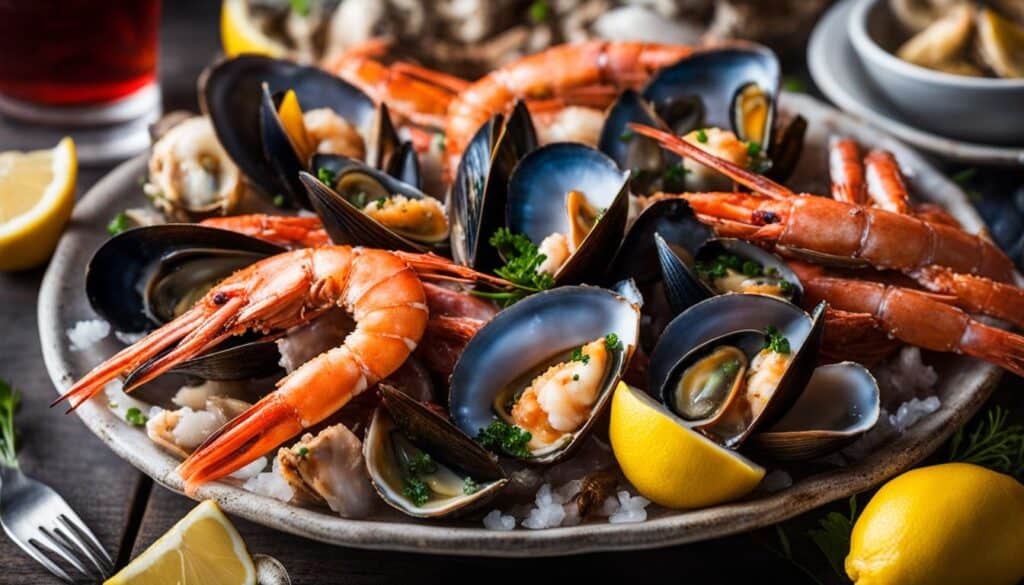
Oysters, in particular, are known for their exceptional zinc content. Just six medium-sized oysters provide a staggering 300% of the daily value for males and 413% for females. This makes oysters a true zinc powerhouse. Additionally, crab, shrimp, and mussels also contain significant amounts of zinc, making them excellent choices for those looking to boost their zinc intake.
Not only are shellfish rich in zinc, but they also offer a plethora of other essential nutrients. They are excellent sources of protein, omega-3 fatty acids, vitamins, and minerals, all of which contribute to a well-rounded and nutritious diet. Enjoying a seafood feast with shellfish can provide you with a wide array of health benefits, from supporting brain function to promoting heart health.
Types of Shellfish and Their Zinc Content
| Shellfish | Zinc Content (per 100g) |
|---|---|
| Oysters | 16-182mg |
| Crab | 4-7mg |
| Shrimp | 1-3mg |
| Mussels | 2-5mg |
Indulge in a platter of fresh oysters, a succulent crab cocktail, or a flavorful shrimp stir-fry to not only satisfy your taste buds but also nourish your body with valuable zinc. Incorporating these shellfish into your diet can help ensure that you meet your daily zinc requirements, supporting your immune system, promoting healthy growth, and aiding in wound healing.
Whether you’re a seafood enthusiast or someone looking to increase their zinc intake, incorporating shellfish into your meals can provide a delicious and nutritious solution. Remember to choose fresh, sustainably sourced shellfish and prepare them in a variety of ways to enjoy their tantalizing flavors and reap the benefits of their high zinc content. Explore exciting recipes and savor the goodness of shellfish for a healthier you!
Zinc-Rich Legumes: A Nutritious Addition to Your Diet
When it comes to zinc-rich foods, legumes are a valuable source that should not be overlooked. Legumes like chickpeas, lentils, and beans not only offer a considerable amount of zinc but also provide numerous other health benefits. Including legumes in your diet can help you meet your daily zinc intake while enjoying a variety of delicious and nutritious meals.
The High Zinc Content of Legumes
Legumes are known for their high zinc content, making them an important source of this essential mineral. In addition to zinc, legumes also offer a range of other nutrients such as protein and fiber. For example, a 100-gram serving of cooked chickpeas contains approximately 1.5 milligrams of zinc, which is about 10% of the recommended daily intake for adults.
While legumes do contain phytates, which can inhibit zinc absorption, there are ways to enhance the bioavailability of zinc in legumes. Methods like heating, sprouting, soaking, or fermenting legumes can help reduce the phytate content and improve zinc absorption. So, don’t let the phytates discourage you from enjoying legumes as part of a balanced diet.
Delicious and Versatile Legume Recipes
There are countless ways to incorporate legumes into your meals, whether you prefer creamy hummus, hearty lentil soups, or flavorful bean salads. Legumes can be used as a base for dips, added to stews and curries, or included in vegetarian burger patties. Their versatility allows for endless culinary creativity while reaping the health benefits.
Here are a few simple legume recipes to get you started:
- Chickpea Salad: Toss together cooked chickpeas, diced vegetables, herbs, and a simple vinaigrette for a refreshing and nutrient-packed salad.
- Lentil Curry: Cook lentils with an array of aromatic spices, tomatoes, and coconut milk for a flavorful and satisfying curry.
- Black Bean Tacos: Fill corn tortillas with seasoned black beans, fresh toppings like avocado and salsa, and a squeeze of lime for a tasty and protein-rich meal.
By incorporating legumes into your diet, you can not only increase your zinc intake but also enjoy a wide range of nutritional benefits. Discover the delicious possibilities and reap the rewards of these versatile and nutrient-dense legumes!
| Legume | Zinc Content (per 100 grams) |
|---|---|
| Chickpeas | 1.5 mg |
| Lentils | 1.2 mg |
| Kidney Beans | 0.9 mg |
| Pinto Beans | 0.8 mg |
| Black Beans | 0.9 mg |
Seeds: A Nutritious and Zinc-Rich Addition to Your Diet
Seeds are not only a tasty and versatile ingredient in cooking and baking, but they also offer a wealth of health benefits, including a high content of zinc. Incorporating these small powerhouses into your diet can help increase your zinc intake while providing a range of other essential nutrients.
One of the zinc-rich seeds is hemp seeds. Just three tablespoons of hemp seeds contain approximately 27% of the daily value of zinc for males and 37% for females. They are also a great source of healthy fats, fiber, and other important vitamins and minerals.
Other seeds such as pumpkin, squash, and sesame seeds also boast significant amounts of zinc. These seeds can be easily incorporated into your meals and snacks, adding a delicious crunch and a nutritional boost. They are particularly beneficial for individuals following vegetarian or vegan diets, as they provide plant-based sources of this essential mineral.
“Seeds are a great way to add zinc to your diet. They’re packed with nutrients and can be easily incorporated into various recipes.”
Benefits of Seeds:
- High in zinc content, supporting immune function and overall health
- Rich in fiber, promoting digestive health
- Provide healthy fats, which are important for brain function and heart health
- Contain various vitamins and minerals, contributing to overall well-being
Whether sprinkled on top of salads, added to smoothies, or used as a flavorful garnish, seeds are a versatile and nutritious addition to any diet. Remember to consume them in moderation as part of a balanced eating plan.
| Seed | Zinc Content (% DV per 3 tablespoons) |
|---|---|
| Hemp Seeds | 27% (males), 37% (females) |
| Pumpkin Seeds | 20% (males), 27% (females) |
| Squash Seeds | 18% (males), 24% (females) |
| Sesame Seeds | 17% (males), 23% (females) |
Incorporating zinc-rich seeds into your diet is an easy and delicious way to ensure you meet your daily zinc requirements while enjoying a variety of flavors and textures. So go ahead and sprinkle some seeds on your next meal to add a healthy boost of nutrients to your plate!
Nuts (and peanuts)
Nuts and peanuts are not only delicious snacks but also great sources of zinc. Including these tasty treats in your diet can help boost your zinc intake and provide a range of health benefits.
Cashews, for example, are a standout nut when it comes to zinc content. Just one ounce of cashews provides approximately 15% of the daily value of zinc for males and 21% for females. Other nuts like pine nuts, almonds, and peanuts (technically a legume) also contain significant amounts of zinc.
Not only are nuts packed with zinc, but they also offer other essential nutrients. They are rich in fiber, which helps support a healthy digestive system, and contain beneficial fats that contribute to heart health. Additionally, nuts are a good source of other vitamins and minerals, making them a nutritious addition to any diet.
So, next time you’re looking for a satisfying snack, reach for a handful of nuts or peanuts. Not only will they satisfy your cravings, but they will also provide you with a natural and tasty source of zinc.
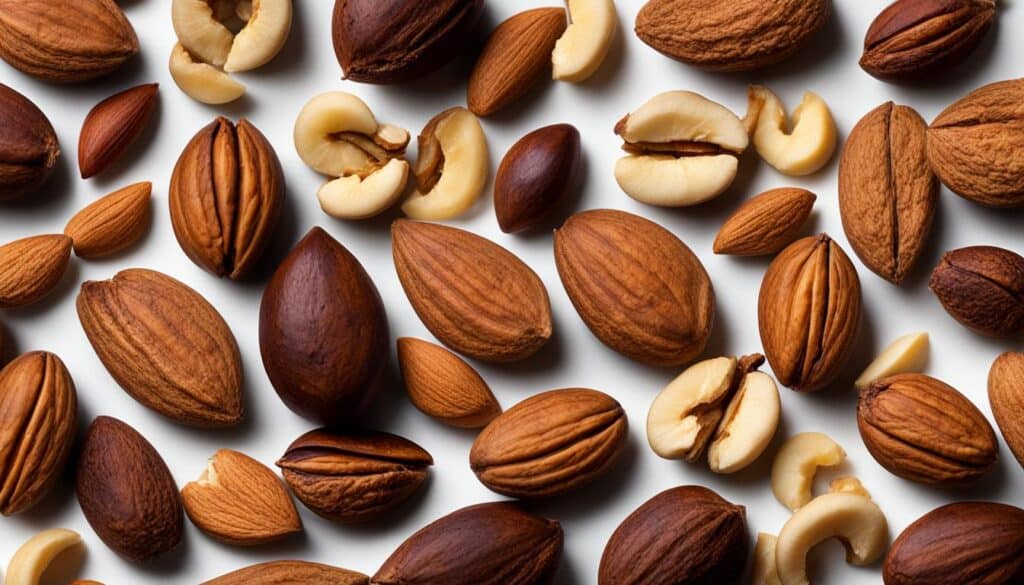
The Benefits of Nuts
Alongside their high zinc content, nuts offer a range of health benefits. Let’s take a closer look:
- Heart Health: Nuts are rich in monounsaturated and polyunsaturated fats, which can help reduce bad cholesterol levels and lower the risk of heart disease.
- Weight Management: Despite being calorie-dense, nuts can actually help with weight management. The combination of protein, healthy fats, and fiber in nuts helps keep you feeling full and satisfied, reducing the likelihood of overeating.
- Brain Health: Many nuts are rich in antioxidants and omega-3 fatty acids, which are beneficial for brain health. Regular nut consumption has been linked to improved cognitive function and a reduced risk of age-related cognitive decline.
- Reduced Inflammation: The healthy fats and antioxidants in nuts have anti-inflammatory properties, which can help reduce inflammation in the body and support overall health.
- Improved Nutrient Absorption: The healthy fats in nuts can enhance the absorption of fat-soluble vitamins like vitamin A, D, E, and K, helping your body make the most of these important nutrients.
So, whether you enjoy them as a snack, sprinkle them on your salads or incorporate them into your favorite recipes, nuts are a delicious and nutritious way to boost your zinc intake and support your overall well-being.
Dairy
Dairy products like cheese and milk are excellent sources of zinc. For example, 1 ounce of sharp cheddar cheese provides 10% of the daily value of zinc for males and 13% for females, while a cup of whole milk offers 9% for males and 13% for females. Dairy products are also rich in other important nutrients like calcium, protein, and vitamin D. Including dairy in your diet can help ensure that you meet your daily zinc requirements.
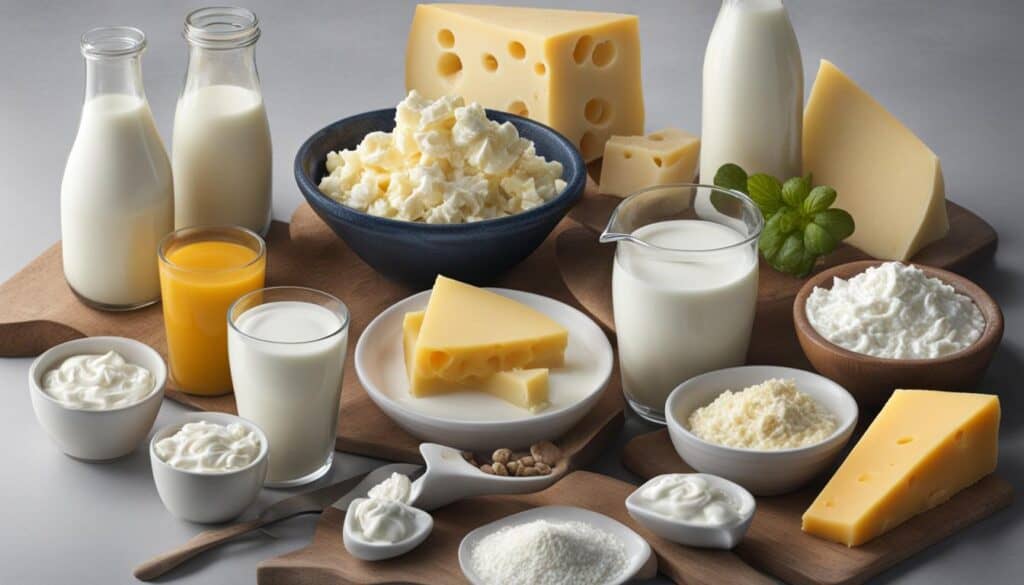
In addition to its zinc content, dairy products offer numerous health benefits. Calcium, found in abundance in dairy, is crucial for maintaining strong bones and teeth. The protein in dairy helps repair and build tissues, while vitamin D aids in calcium absorption and promotes immune function. Incorporating dairy into your diet can contribute to overall health and well-being.
The Benefits of Yogurt
Yogurt, a popular dairy product, deserves special attention for its nutritional value and potential health benefits. Besides being a good source of zinc, yogurt contains probiotics, which are beneficial bacteria that support gut health. Probiotics can enhance digestion, boost the immune system, and even improve mental health. Opt for plain yogurt without added sugars to maximize the health benefits.
Summary:
- Dairy products like cheese and milk are rich sources of zinc.
- Including dairy in your diet helps meet your daily zinc requirements and provides essential nutrients like calcium, protein, and vitamin D.
- Yogurt, a popular dairy product, offers additional health benefits due to the presence of probiotics.
So, whether you enjoy a glass of milk, a slice of cheese, or a serving of yogurt, incorporating dairy into your diet can be an effective way to boost your zinc intake and support your overall health.
Eggs: A Nutritious Source of Zinc
Eggs are an incredibly versatile and nutrient-rich food that can be enjoyed in various ways. Not only are they a great source of protein, but they also contain essential vitamins and minerals, including zinc. Zinc plays a crucial role in supporting the immune system, promoting wound healing, and maintaining overall health.
A large egg contains approximately 5%–7% of the daily value of zinc for both males and females. This means that incorporating eggs into your diet can help you meet your daily zinc requirements. In addition to zinc, eggs also provide other beneficial nutrients like healthy fats, selenium, choline, and several B vitamins.
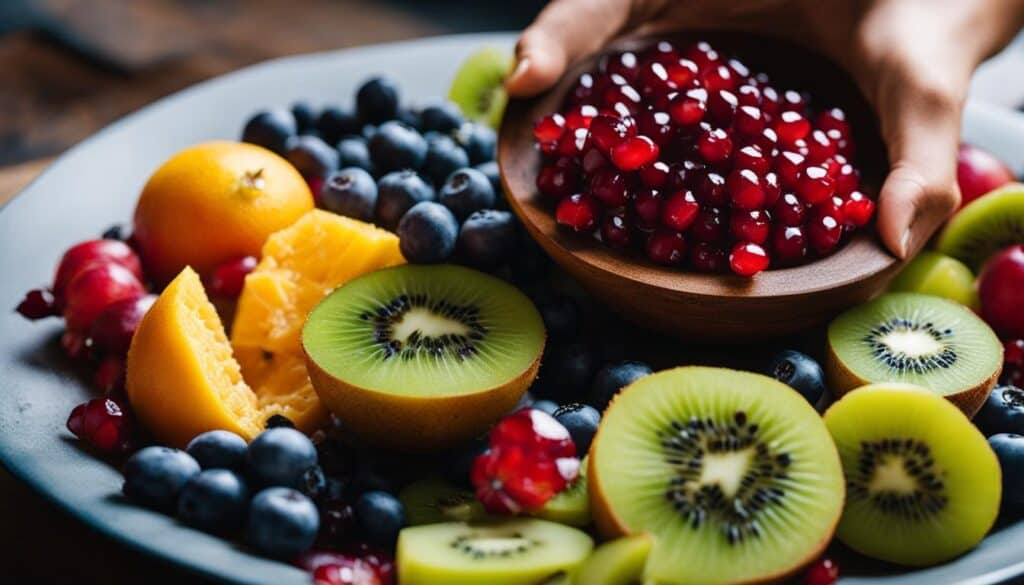
Including eggs in your meals can be a simple and convenient way to boost your zinc intake. Whether you prefer them scrambled, fried, boiled, or incorporated into dishes like omelets and quiches, eggs offer a delicious and nutritious addition to any diet.
Table: Nutritional Content of Eggs (per large egg)
| Nutrient | Amount |
|---|---|
| Protein | 6 grams |
| Fat | 5 grams |
| Zinc | 0.7 milligrams |
| Selenium | 15.4 micrograms |
| Choline | 147.9 milligrams |
| Vitamin B12 | 0.6 micrograms |
Incorporating eggs into your diet not only provides a convenient source of zinc but also offers a wide range of health benefits. Remember to enjoy them as part of a balanced diet that includes a variety of other zinc-rich foods to ensure optimal nutrition and overall wellbeing.
Conclusion
Zinc is an essential mineral that is vital for maintaining overall health and well-being. While it is commonly found in animal-based foods, there are also several fruits, vegetables, and nuts that are rich sources of this important nutrient. Including these zinc-rich foods in your diet can have numerous benefits for your body.
One of the key roles of zinc is in supporting a healthy immune system. By incorporating zinc-rich fruits, such as strawberries, avocados, and pomegranates, into your diet, you can give your immune system the boost it needs to fight off infections and keep you healthy.
Zinc is also important for metabolism and tissue repair. Consuming foods like legumes, seeds, and nuts, which are high in zinc, can help support these processes, allowing your body to function at its best. Additionally, zinc plays a role in wound healing, making it essential for the repair and regeneration of tissues.
It is important to remember that a balanced diet is key when it comes to meeting your daily zinc requirements. By including a variety of zinc-rich foods in your meals, you can ensure that you are getting an adequate intake of this important mineral. So, make sure to prioritize zinc-rich fruits, vegetables, and nuts to support your overall health and well-being.
FAQ
What are some fruits that are high in zinc?
Some fruits that are rich in zinc include avocados, pomegranates, blackberries, and raspberries.
How much zinc is there in meat?
Meat, such as beef, lamb, and pork, is an excellent source of zinc. A 100-gram serving of raw ground beef contains approximately 44%–60% of the recommended daily value of zinc.
Which shellfish are high in zinc?
Oysters, crab, shrimp, and mussels are healthy and delicious sources of zinc. Oysters, in particular, are considered a zinc powerhouse, providing 300% of the daily value for males and 413% for females in just six medium oysters.
Can legumes provide enough zinc?
Yes, legumes like chickpeas, lentils, and beans contain considerable amounts of zinc. While legumes also contain phytates, which can inhibit zinc absorption, processing methods like heating, sprouting, soaking, or fermenting legumes can help improve the bioavailability of zinc.
Which seeds are rich in zinc?
Seeds like hemp, pumpkin, squash, and sesame seeds are packed with zinc. Three tablespoons of hemp seeds provide approximately 27% of the daily value of zinc for males and 37% for females.
Can nuts be a good source of zinc?
Yes, nuts like pine nuts, cashews, almonds, and peanuts (technically a legume) are a convenient and tasty source of zinc. For example, cashews provide 15% of the daily value of zinc for males and 21% for females in a 1-ounce serving.
Are dairy products a good source of zinc?
Yes, dairy products like cheese and milk are excellent sources of zinc. For instance, 1 ounce of sharp cheddar cheese provides 10% of the daily value of zinc for males and 13% for females.
Can eggs contribute to zinc intake?
Yes, eggs are a versatile source of zinc. One large egg provides approximately 5%–7% of the daily value of zinc for both males and females.
Why is zinc important for overall health?
Zinc is an essential mineral that plays a crucial role in maintaining overall health. It supports various bodily functions, including metabolism, immune system maintenance, and tissue repair. Zinc is necessary for optimal health and wellbeing.

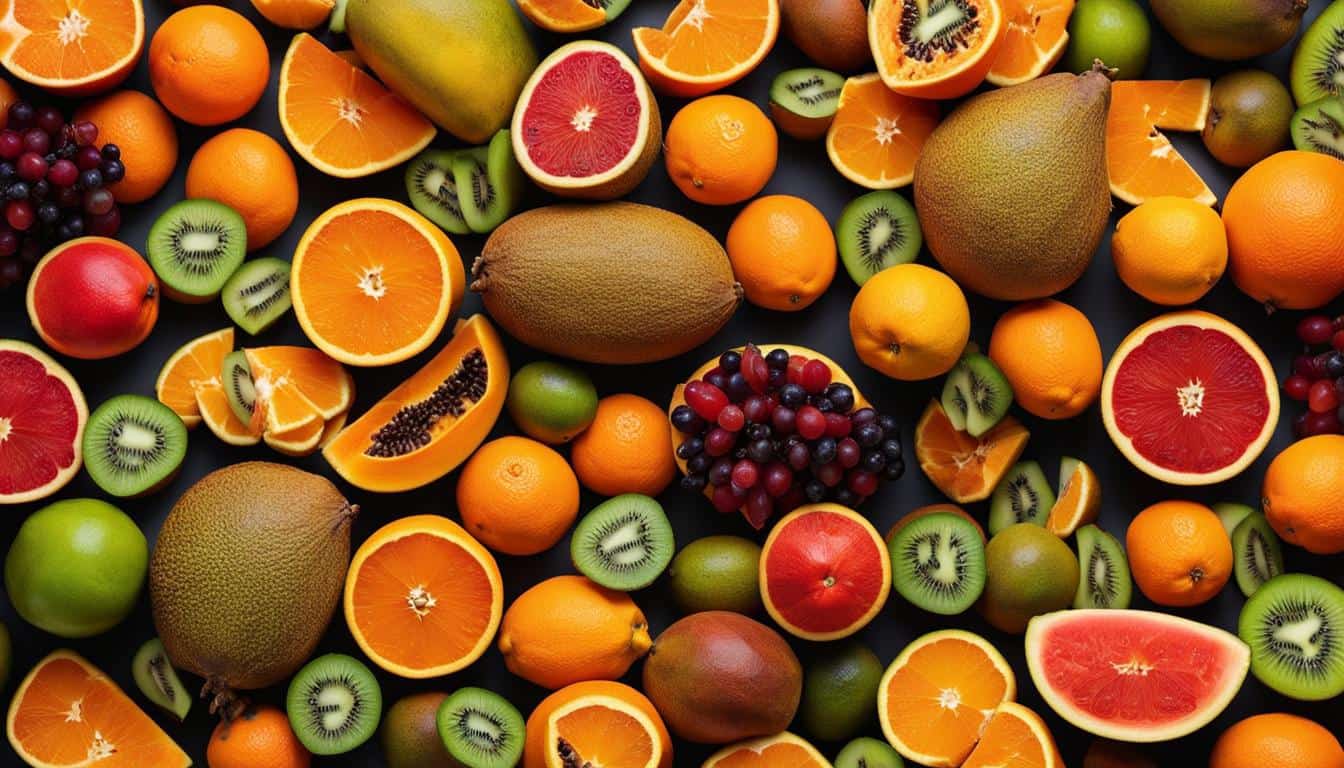



Leave a Reply